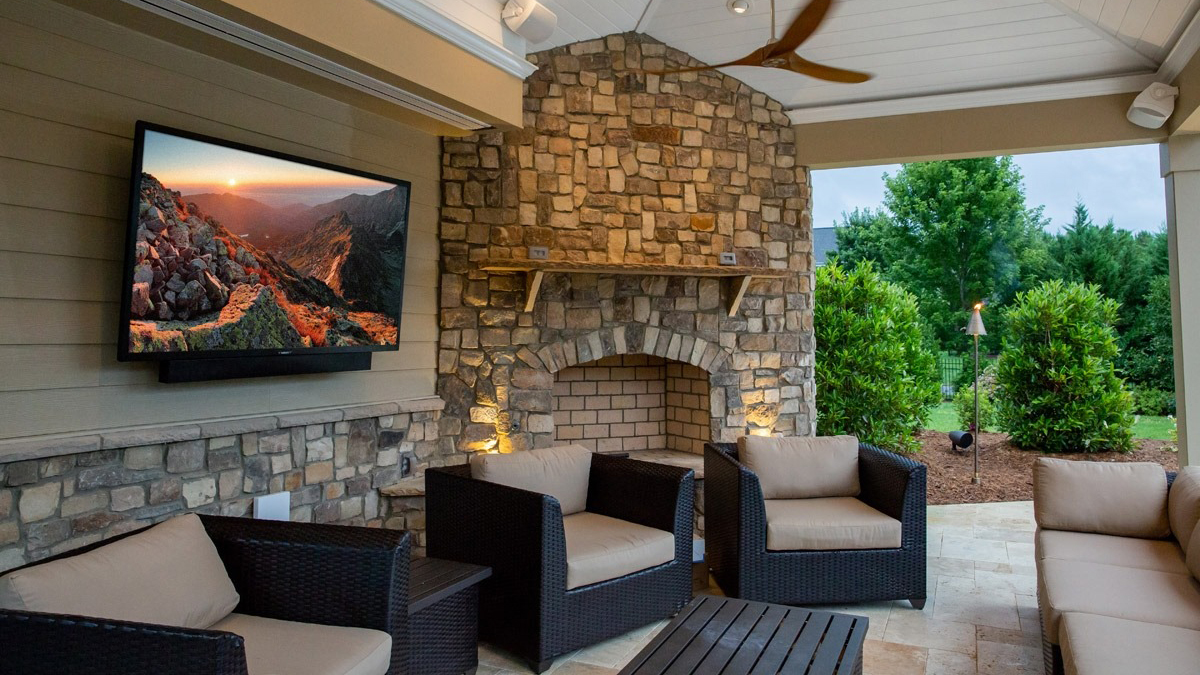There’s nothing better than finishing off a work day and hitting the couch to watch your favorite team play, the next episode in your latest Netflix show, or an epic movie. But what happens if you’re also keeping an eye on a BBQ? Or just want a little fresh air? An outdoor TV can solve all of these issues – and we certainly wouldn’t blame you for wanting one.
An outdoor TV is also a great way to entertain guests – and in a world of quarantine and isolation, it may be the only way to safely watch TV with a friend or two without getting too close and being inside together.
No matter the reason for considering an outdoor TV, there are a few things you should know before you pull the trigger.
Should I buy an outdoor TV?
There are plenty of reasons to consider buying an outdoor TV. Perhaps you’re setting up an outdoor entertainment area, and need something to tie it together. Or, maybe you want to make sure you don’t miss the game while you’re cooking on a patio grill.
In any case, it’s important to set expectations and make sure you find the best bang for your buck. Indoor TVs are getting better and better – thanks to technology like OLED, HDR, and high resolutions like 4K. Thankfully, outdoor TVs aren’t missing out on that, but the latest technology is a little slower to show up on these outdoor TVs than it is indoor ones. The ones that do have this tech are often more expensive than indoor options too.
Having said that, if you don’t mind spending a little extra cash to get the right product, and feel that an outdoor TV would complete your outdoor setup, then it may be worth buying one.

Is it safe to put a TV outdoors?
There are two main issues to consider when buying a TV for outdoor use -- weather, and security. Let’s start with weather.
There are a few ways to ensure that your TV doesn’t get damaged in bad weather. The first way to do so is to buy a TV that was designed and built to be used outside. These TVs usually have some kind of weather-proofing, and a display that is bright enough to offer a good image even in direct sunlight – but are often bulkier and more expensive than their indoor counterparts.
The other option is you buy a regular TV, but keep it in a weather-proof case that you close up when you’re not using the TV. In this situation, you’ll have to ensure that you’re not using the TV when it’s raining or snowing, and this probably isn’t the best option for areas where it gets really cold or really hot. The advantage to this, however, is that you can spend less on a TV -- and in some situations, it may look better too.
Ultimately, if you can afford doing so we recommend buying a TV that was designed for outdoor use. This ensures that even if the weather gets a little crazy, your TV should remain perfectly fine – and you don’t have to worry about perfectly sealing up your TV when you’re not using it. That’s true even under a covered patio. There are other risks besides rain – such as insects, temperature variation, and so on.
The other main issue is security. It’s a good idea to ensure that the area you keep your outdoor TV is as hidden as possible from passers-by. And, it’s also a good idea to have a security camera set up outside in case something does happen. Of course, you should also make sure that your TV is properly bolted into a wall, rather than just having it on a stand like you might inside.
- Need some audio too? Check out these 10 outdoor speakers
What does an outdoor TV cost?
If you want to put a TV outdoors, you’re going to have to pay up a little. If you buy an actual purpose-built TV, you’re looking at around $1,000 on the low-end, and around $3,000 for a mid range option.
If you want to save cash, buying a standard TV and outdoor TV cabinet may be the way to go, considering you could buy a normal TV for a relatively small amount, and a cabinet for not much more. All in, you should be able to put together a solution for well under the cost of a dedicated outdoor TV.
from TechRadar - All the latest technology news https://ift.tt/320Gme9
via IFTTT https://ift.tt/35QbLBb
No comments:
Post a Comment